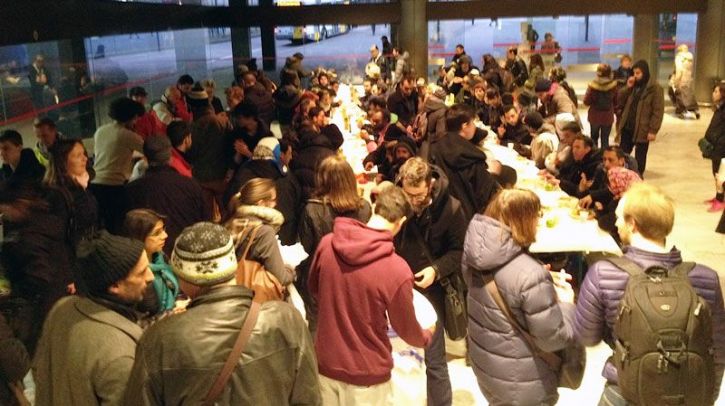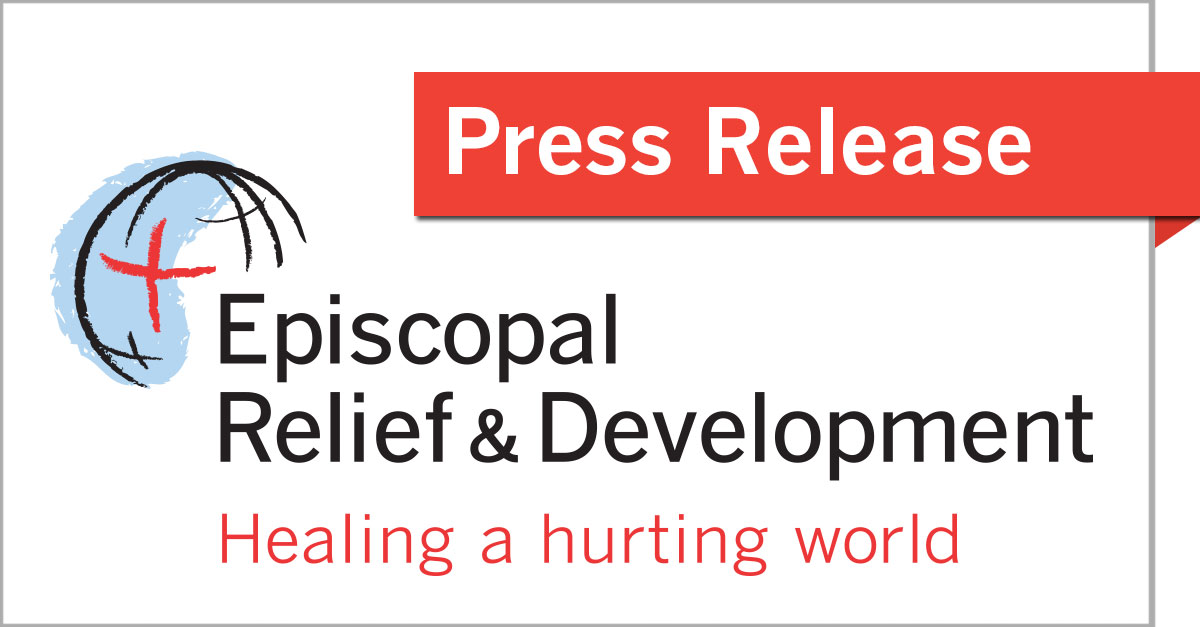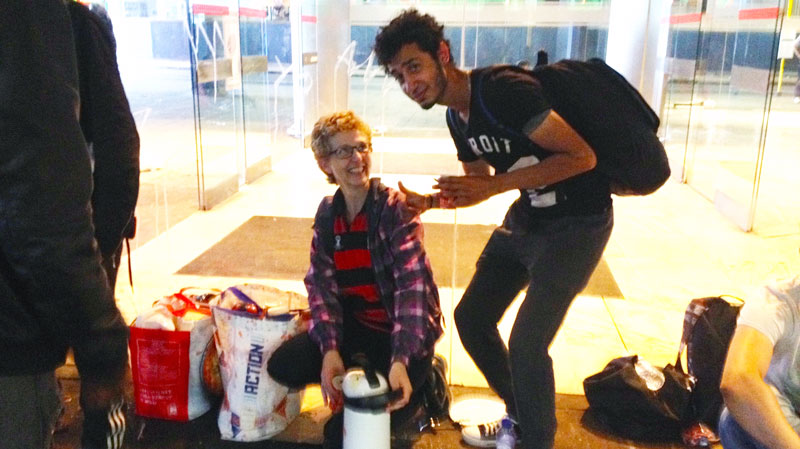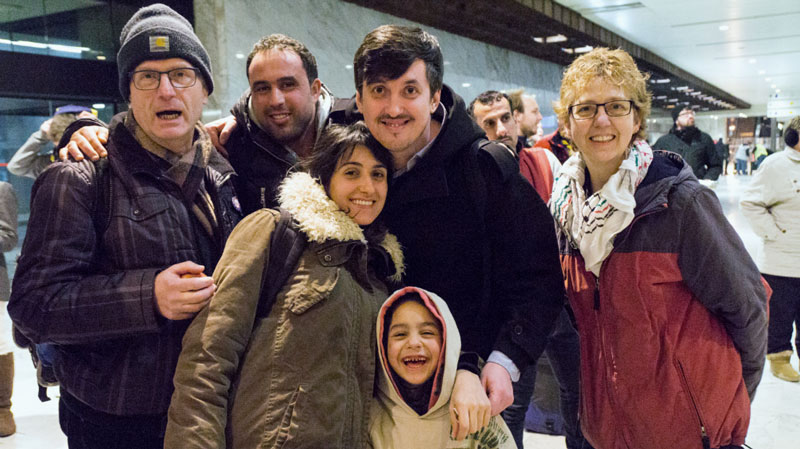Episcopal Relief & Development Supports All Saints’ Syrian Outreach Ministry in Belgium

 Read the latest Syrian Crisis Updates here
Read the latest Syrian Crisis Updates here
July 28, 2016
Episcopal Relief & Development is supporting the outreach efforts of All Saints’ Episcopal Church in Waterloo, Belgium, to provide meals and other needed services for people seeking safety from violence in Syria and elsewhere in the region. Although the total number of people entering Europe has decreased since late 2015 (UNHCR estimates that 1 million people entered in 2015, half of them from Syria; to date in 2016 more than 240,000 people have entered by sea alone), Belgium is still a major transit point and local organizations are uniting compassionate community members to assist those recently arrived or awaiting legal status. The congregation of All Saints’, a member of the Convocation of Episcopal Churches in Europe, welcomes people with food and fellowship as they navigate their next steps.
Located about 20 miles away from Brussels’ central Gare du Nord train station, volunteers from All Saints’ travel to the station two days each week to serve a meal and deliver much-needed clothing, toiletries and sleeping gear to people often arriving with only the bare minimum: the clothes they are wearing, and their link to home – a cell phone. All Saints’ rector The Rev. Sunny Hallanan says, “We try to help them find a place to sleep other than the nearby park or garages… and we listen to their stories and offer a smile and encouragement.”

Hallanan remarked that in August 2015 her congregation felt the need to assist displaced people arriving in their city, but were unsure how to begin. Initially, they sent money to local organizations providing services, but after a core group from All Saints’ started volunteering in the temporary camps and became more confident in talking to people and building relationships, the church’s outreach ministry began to develop. From providing simple pieces of fruit once a week at the Gare du Nord, the operation has expanded to include larger and more varied meals, with input from those they are serving. Now, as other organizations reduce services and media attention fades, the church intends to add a third meal to the program to address ongoing needs.
“Unfortunately, we are not located close enough to the area of need to serve directly in our building… [but] we are using church facilities for cooking eggs and baking and preparing the hot beverages we serve. We are also acting as a drop-off point/clearinghouse for community donations for refugees,” Hallanan stated. “Scout troops and area schools are now holding collections of donations for us to take, and occasionally volunteer with us. Our community is seeing [the church] more as the place that helps refugees, and the place that can help them help refugees.”
In support of this ministry, All Saints’ congregation members donate some of the food supplies to serve approximately 100 people at each meal, supplemented with additional food purchased with parish funds and special fundraising efforts. All Saints’ has also developed a partnership with local group Food 4 Friends, and together they are contributing to the creation of an organization called “Unless” that seeks to renovate a newly purchased building to house a laundry and shower program. Hallanan hopes that All Saints’ parishioners can fund the purchase and installment of one washer and one dryer, challenging other churches and organizations in the area to match their donation in support of this important ministry.
“The Episcopal community in Europe has been inspiring in its compassionate effort to bring safety, comfort and fellowship to those who are displaced,” said Nagulan Nesiah, Episcopal Relief & Development’s Senior Program Officer for Disaster Response and Risk Reduction. “The people of All Saints’ Church in Waterloo especially have taken initiative, continuing to increase their activities and motivating the wider community to get involved in outreach efforts as well.”

In the wake of Syria’s ongoing civil war, an estimated 11.3 million people have been displaced by violence and are seeking safety both within Syrian borders and elsewhere. Inside Syria, Episcopal Relief & Development supports the efforts of the Fellowship of Middle East Evangelical Churches (FMEEC) to provide rent subsidies and meet basic needs for those who are internally displaced. For those seeking refuge in Europe, Episcopal Relief & Development aided Islamic Relief in providing food and other assistance to those transiting through Greece and Macedonia, and the Convocation of Episcopal Churches in Europe continues to support local congregations in their efforts to help people settle in their new home countries. Specifically, the organization has supported welcome centers such as the Joel Nafuma Refugee Center (JNRC) in Rome, the Asylum Seeker Center in Munich and a center at Le Jongle (‘The Jungle’) in Calais. These centers partner with local organizations to support meal distribution, vocational training and job placement programs, language and cultural assistance, mobile medical units, therapy programs and other fellowship activities.
“I am extremely proud of the Episcopal Church response in mobilizing existing ministries and resources to meet the needs of those who have lost so much,” Nesiah said. “There is a great deal of creativity and care in our communities, and a sense of call to ‘welcome the stranger’ and provide material and spiritual support to help them on their way. I am grateful to Sunny and her colleagues at All Saints’ and to all our partners in Europe who are taking this charge to heart and making such an impact.”
Donations to the Global Needs Fund will enable Episcopal Relief & Development to respond where most needed, in crises large and small. Please continue to pray for Syria and countries around the world where violence and conflict devastate lives and tear communities apart.
For over 75 years, Episcopal Relief & Development has served as a compassionate response to human suffering in the world. The agency works with more than 3 million people in nearly 40 countries worldwide to overcome poverty, hunger and disease through multi-sector programs, using the Sustainable Development Goals (SDGs) as a framework. An independent 501(c)(3) organization, it works closely with Anglican Communion and ecumenical partners to help communities create long-term development strategies and rebuild after disasters.
Photos by Felicity Handford, member of All Saints’ Episcopal Church, Waterloo, and photographer for the Convocation of Episcopal Churches in Europe.


